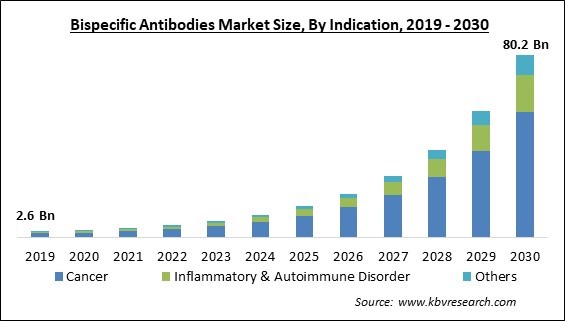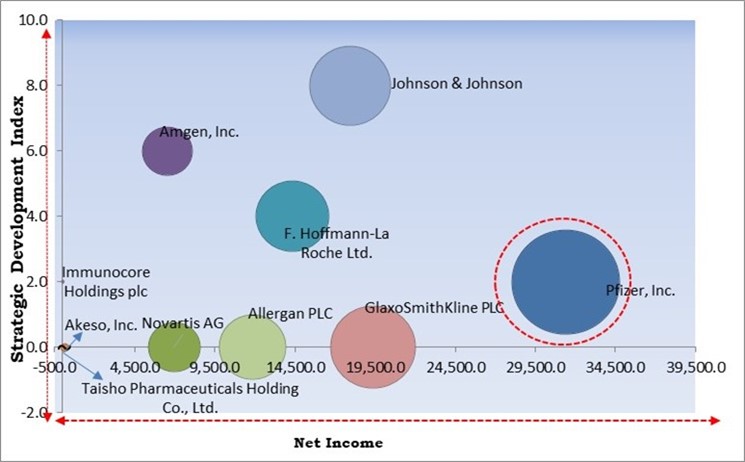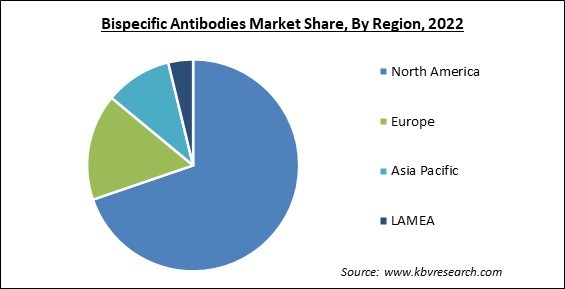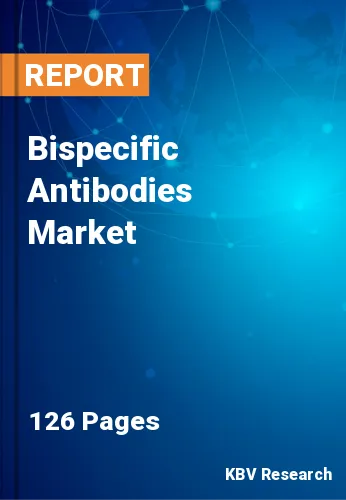The Global Bispecific Antibodies Market size is expected to reach $80.2 billion by 2030, rising at a market growth of 40.9% CAGR during the forecast period.
A significant factor that will increase the market's growth rate is the increase in cancer incidence. Cancer segment is expected to generate more than 68% share of the market by 2030. The prevalence of sedentary lifestyle adoption suggests that many individuals are active, which increases their chance of developing cancer. The International Agency for Research on Cancer estimates that in Mexico, Argentina, and Saudi Arabia, there were, respectively, 195499, 130 878, and 27 885 new cases of cancer in 2020. The risk of cancer is further increased by a sedentary lifestyle that involves eating fast food and packaged goods. Therefore, growth in adopting a sedentary lifestyle reflects a rise in cancer rates, prompting the creation of more effective cancer medicines. Hence, the rising prevalence of these diseases and disorders is further expediting the expansion of the market.

The major strategies followed by the market participants are Partnerships as the key developmental strategy to keep pace with the changing demands of end users. For instance, In May, 2020, Janssen Biotech, Inc., one of the Janssen Pharmaceutical Companies of Johnson & Johnson, signed an agreement with Lava Therapeutics B.V to discover and develop novel bispecific antibodies to gamma-delta T cells for the treatment of cancer. Additionally, In June, 2020, F. Hoffmann-La Roche Ltd. joined hands with Innovent Biologics, Inc. for the treatment of cancer, metabolic, autoimmune, and other major diseases. The collaboration aims at discovering, developing, and commercialization of bispecific antibodies and multiple cell therapies.
Based on the Analysis presented in the KBV Cardinal matrix; Pfizer, Inc. is the major forerunner in the Market. In January, 2022, Pfizer signed a research collaboration and license agreement with Dren Bio to concentrate on the discovery and development of therapeutic bispecific antibodies for selecting oncology targets utilizing Dren Bio’s proprietary Targeted Myeloid Engager and Phagocytosis Platform. Companies such as Johnson & Johnson, F. Hoffmann-La Roche Ltd., GlaxoSmithKline PLC are some of the key innovators in the Market.

The growing demand for individualized and targeted medicines is anticipated to be favorable for the market. BsAbs have the ability to be created to specifically target particular cell types or chemicals, enabling a more targeted, effective therapy with fewer adverse effects. In the context of uncommon diseases, when conventional medicines may not be accessible or effective, this tailored approach is especially pertinent. Therefore, the growing demand for bispecific antibodies to be used in personalized and targeted medicines will drive the growth of the market in the coming years.
Bispecific antibodies with distinct biological and pharmacological properties are the subject of intense research because they have the potential to be effective therapeutic agents. The development of more potent and accurate target medication candidates is anticipated to be facilitated by advancements and innovation in antibody and proton engineering. The possibility to produce more than 50 new medication forms has recently been made possible by the application of these cutting-edge bioengineering approaches. Investments made to create cutting-edge technology and expand the number of developing marketplaces also contribute to the market's growth. These elements will present advantageous chances for the market to expand.
Like any therapeutic agents, bispecific antibodies need to demonstrate a favorable safety profile. Concerns regarding potential toxicities and immunogenicity (i.e., the immune system's response to the antibodies) can impact the development and acceptance of bispecific antibodies. The FDA granted Blinatumomab approval in 2014 for treating acute lymphoblastic leukaemia (ALL) that has relapsed or become resistant. There is emerging knowledge of the intrinsic and potentially fatal negative consequences of antibody-based immunotherapies and their amazing clinical success. Therefore, these elements are obstructing the growth of the market.

Based on indication, the market is characterized into cancer, inflammatory & autoimmune disorder, and others. The inflammatory and autoimmune disorder segment procured a considerable growth rate in the market in 2022. Rheumatoid arthritis, Crohn's disease, psoriasis, and multiple sclerosis are just a few of the illnesses that fall under the category of autoimmune and inflammatory disorders. Chronic inflammation, tissue damage, and organ malfunction can result from these conditions, which can majorly impact a patient's quality of life. Many individuals with these illnesses don't respond well to or are intolerant of current treatments, leading to serious unmet medical requirements.
| Report Attribute | Details |
|---|---|
| Market size value in 2022 | USD 5.4 Billion |
| Market size forecast in 2030 | USD 80.2 Billion |
| Base Year | 2022 |
| Historical Period | 2019 to 2021 |
| Forecast Period | 2023 to 2030 |
| Revenue Growth Rate | CAGR of 40.9% from 2023 to 2030 |
| Number of Pages | 126 |
| Number of Table | 173 |
| Report coverage | Market Trends, Revenue Estimation and Forecast, Segmentation Analysis, Regional and Country Breakdown, Competitive Landscape, Companies Strategic Developments, Company Profiling |
| Segments covered | Indication, Region |
| Country scope | US, Canada, Mexico, Germany, UK, France, Russia, Spain, Italy, China, Japan, India, South Korea, Singapore, Malaysia, Brazil, Argentina, UAE, Saudi Arabia, South Africa, Nigeria |
| Growth Drivers |
|
| Restraints |
|
Region wise, the market is analyzed across North America, Europe, Asia Pacific, and LAMEA. The North America segment acquired the largest revenue share in the market in 2022. Some of the primary variables influencing the regional market's growth are the existence of multiple market participants and the various developments undertaken by them. This has resulted in an increase in R&D spending, technological developments, and higher demand. In order to take advantage of complementary skills and technology to generate bispecific antibodies, businesses are also actively collaborating and forming partnerships. Such collaborations have sped up research and development efforts, contributing to the market's growth.
Free Valuable Insights: Global Bispecific Antibodies Market size to reach USD 80.2 Billion by 2030
The market research report covers the analysis of key stake holders of the market. Key companies profiled in the report include Amgen, Inc., F. Hoffmann-La Roche Ltd., Pfizer, Inc., Akeso, Inc., Johnson & Johnson (Janssen Global Services, LLC), Taisho Pharmaceuticals Holding Co., Ltd., Immunocore Holdings plc, GlaxoSmithKline PLC (GSK), Novartis AG, and Allergan PLC (AbbVie, Inc.).
By Indication
By Geography
The Market size is projected to reach USD 80.2 billion by 2030.
Growing research development endeavors are driving the Market in coming years, however, Safety and immunogenicity concerns owing to adverse side effects restraints the growth of the Market.
Amgen, Inc., F. Hoffmann-La Roche Ltd., Pfizer, Inc., Akeso, Inc., Johnson & Johnson (Janssen Global Services, LLC), Taisho Pharmaceuticals Holding Co., Ltd., Immunocore Holdings plc, GlaxoSmithKline PLC (GSK), Novartis AG, and Allergan PLC (AbbVie, Inc.).
The expected CAGR of this Market is 40.9% from 2023 to 2030.
The Cancer segment is leading the Global Bispecific Antibodies Market by Indication in 2022, thereby, achieving a market value of $54.9 billion by 2030.
The North America market dominated the Global Bispecific Antibodies Market by Region in 2022, and would continue to be a dominant market till 2030; thereby, achieving a market value of $52 billion by 2030.
Our team of dedicated experts can provide you with attractive expansion opportunities for your business.

